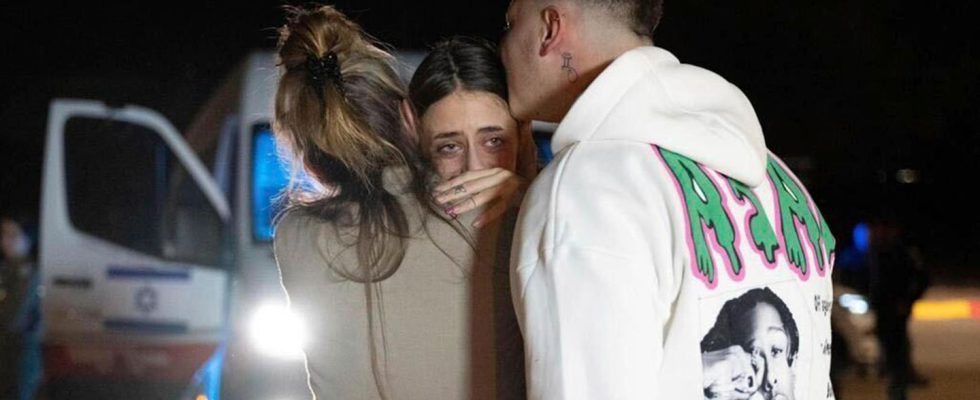War in the Middle East
Hamas’s most important collateral: Israeli soldiers as hostages
A Hamas hostage is hugged by her mother and brother at Hatzerim air base after her release
© Uncredited / GOP / AP / DPA
Hamas has released several hostages. But she kept the most important ones: Israeli soldiers. The government in Tel Aviv wants to search until they are all back in Israel – even if they are corpses.
Hamas released 105 hostages during the week-long ceasefire in the Gaza Strip. However, the radical Islamic organization continues to hold the greatest collateral in its hands: the Israeli soldiers it kidnapped. Was in the past Israel was willing to make far-reaching concessions to get captured military personnel back – even if they were already dead.
“There is an almost inseparable connection and great moral and emotional closeness between Israeli civil society, the state and the army,” says David Khalfa, one of the heads of the Jean Jaurès Foundation’s North Africa and Middle East Observatory in Paris. “The army played a crucial role in the creation of the state, the protection of its territory and the country’s survival in a hostile environment. Every family has a brother, sister or cousin serving in the military.”
According to Israeli figures, around 240 people who were kidnapped by Hamas fighters during their attack on Israel included at least eleven military personnel, four of them women, and around 40 men of reservist age, according to the AFP news agency. The Israeli army does not provide any figures.
Hamas massacre mastermind swapped for Israeli soldier
The soldiers held hostage bring back painful memories in Israel: in 2004, the government released almost 450 Palestinian prisoners in exchange for the bodies of three soldiers and an Israeli businessman. Soldier Gilad Shalit was held by Hamas for five years before he was exchanged for 1,027 Palestinians in 2011. It was the first time in nearly three decades that a captured Israeli soldier returned alive.
To this day, there is debate in Israel about whether this high price was justified – especially since one of those released in 2011 was the future Hamas leader Jahja Sinwar. Sinwar is believed to be the mastermind of Hamas’s brutal October 7 attack on Israel, in which the Palestinian fighters killed around 1,200 people, according to Israeli sources. In response, Israel launched massive air and ground attacks on targets in the Gaza Strip for weeks. According to Hamas, more than 15,000 Palestinians were killed. The number of victims cannot be independently verified.
Hamas is aware of the importance of the kidnapped soldiers for Israel. For them, every adult man among the hostages is a reservist, i.e. a soldier. Hamas and Islamic Jihad – the second radical Islamic organization in the Gaza Strip, which also has Israelis as hostages – are demanding the release of all approximately 7,000 Palestinian prisoners in Israel in return for the return of the soldiers and men.
Israel wants to turn over every stone for hostages
During the week-long ceasefire from Friday last week to Friday morning, Israel released 240 Palestinian prisoners – all minors or women. The 80 Israeli hostages released in return as part of an agreement include children and women. 136 hostages, including 17 women and children, are still in the control of Hamas in the Gaza Strip. Seven more hostages were killed according to the latest information from the Israeli army.
Avi Melamed, a former Israeli intelligence officer, is certain that Hamas’s demand to exchange all Palestinian prisoners is something that “no Israeli government will ever accept.” Unlike in previous cases, Israel has “a trump card in its hand this time: its soldiers and tanks,” which have moved into the Gaza Strip. “Israel will leave no stone unturned to bring back the hostages, the living and the bodies of the deceased,” says Melamed. “They will turn over every stone in the Gaza Strip.”
The army and the government are not only concerned about the captured soldiers, but also about the bodies of those killed. They will be buried with military honors in Israel.
In the past, Israel did everything it could to rescue those killed. In 2021, the government assured that it was still searching for the remains of Israeli agent Eli Cohen, who was hanged in Syria in 1965. Hamas knows the importance that the bodies of soldiers have in Israel. She still keeps the body of Oron Shaul, who was killed in 2014.

